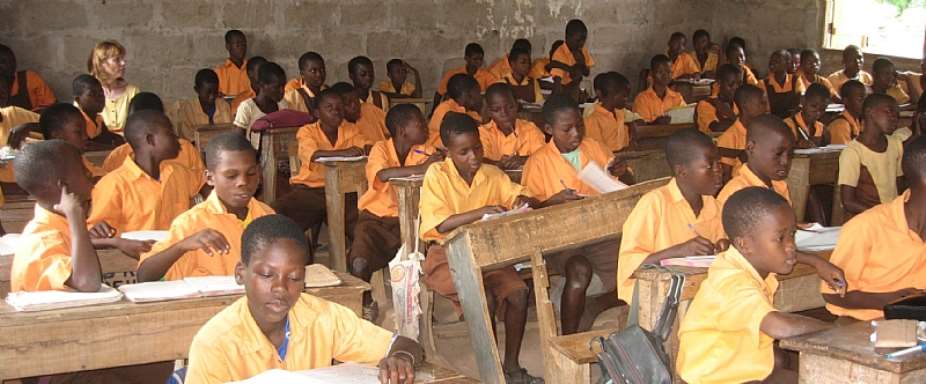Every young person is made to understand that, education is key to success. In 1962, Ghana`s first president, Osagyefo Dr. Kwame Nkrumah introduced free and compulsory primary education in the country, stressing the need for everyone to be educated.
Today, it has been a point of reference to many policy makers in the educational sector and enlightening people on the need to be educated.
This has resulted in the need to establish more educational institutions to cater for the ever increasing demand for education. Ghana, today can boast of numerous universities, polytechnics, colleges of education but majority of them can’t be said to be providing quality education. School is established to give “balanced” approach to education. Unfortunately, our universities, polytechnics and colleges of education are not giving students the skills required to compete on a global scale.
Is it right to say that as the numerous tertiary institutions are being created, the quality of education is reducing? Many have said education is the bedrock of a nation’s development, but can that be said of Ghana?. With, a population of over 25million people and increasing demand for education, governments upon governments takes pride in establishing a number of tertiary institutions without adequately equipping them to meet an acceptable standard.
In advanced countries education has led to breakthrough in scientific research, agricultural research, policy making, medicine and technology. While we are making headways producing quality doctors and nurses, we can’t say the same for other professions.
Let’s take agriculture for example, one will wonder what impact education is having on the agricultural sector despite having specialized universities and colleges of agriculture in Ghana. Many people go to university to study agricultural related courses but cannot practice it as a profession.
Others too study engineering courses like electrical, civil, and mechanical and so on but their contribution has been minimal to the nation’s growth. All these are as result of the poor standard of our educational system in the country. The tertiary education system in Ghana has been ridiculed to the extent that, it is now a mere certificate awarding institution.
The shocking thing is that, thousands of people are being awarded certificates every year with just few privileged to be employed. Now being educated doesn’t necessarily guarantee ones success in a country like Ghana, instead it only gives you a spot in the list of educated populace hoping to be successful. Perhaps, to address these, the conversion of the polytechnics into technical universities which is currently ongoing will be one of the surest ways to provide students with the requisite skills, if they are equipped with adequate logistics.
Government as a matter of urgency needs to revitalize the educational sector of the country. The institutions should be funded to international and acceptable standards to enable them to carry out research that will lead to breakthrough in various sectors in Ghana.
Also, the professional stratification needs to be revisited, in a situation whereby an animal nutritionist is working in an insurance company and a statistician is teaching mathematics in a primary school will only reduce our economic growth. If all these can be done only then, education can contribute to the nation’s growth as always perceived. God bless mother Ghana.
Writer: Mohammed Fugu, a journalist at Institute of Africa Media Monitoring Intelligence and Advocacy (IAMMIA).





 TUC tells informal sector employers to pay their employees the minimum wage
TUC tells informal sector employers to pay their employees the minimum wage
 Prof. Marfo urges good civilian-security relations to promote peace
Prof. Marfo urges good civilian-security relations to promote peace
 I was nearly jailed because of NPP; I’m still ‘pained’ — Hopeson Adorye
I was nearly jailed because of NPP; I’m still ‘pained’ — Hopeson Adorye
 Rising against NPP after being a minister for 15 years is a sin; God will judge ...
Rising against NPP after being a minister for 15 years is a sin; God will judge ...
 Cecilia Dapaah: Reasons behind AG’s advice to EOCO not grounded in law – Martin ...
Cecilia Dapaah: Reasons behind AG’s advice to EOCO not grounded in law – Martin ...
 NPP should have reported Kingsley Nyarko’s conduct to police – Inusah Fuseini
NPP should have reported Kingsley Nyarko’s conduct to police – Inusah Fuseini
 Akufo-Addo cuts sod for MIIF Technical Training Centre
Akufo-Addo cuts sod for MIIF Technical Training Centre
 NPP didn’t struggle to win Ejisu by-election – Samuel Ayeh-Paye
NPP didn’t struggle to win Ejisu by-election – Samuel Ayeh-Paye
 A/R: Achiase Chief arrested for acid attack on community members
A/R: Achiase Chief arrested for acid attack on community members
 Naa Ayemoede returns to school
Naa Ayemoede returns to school
